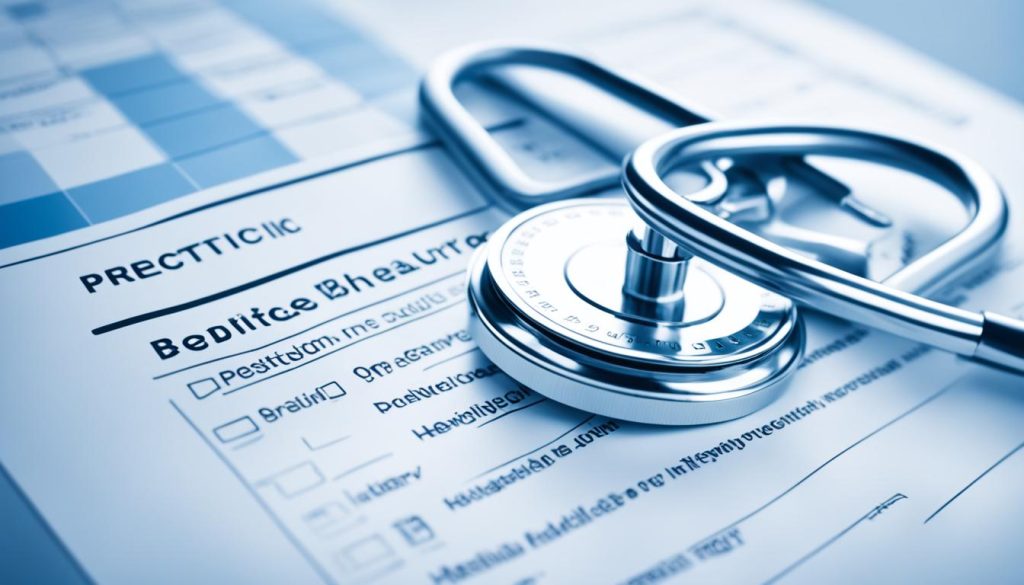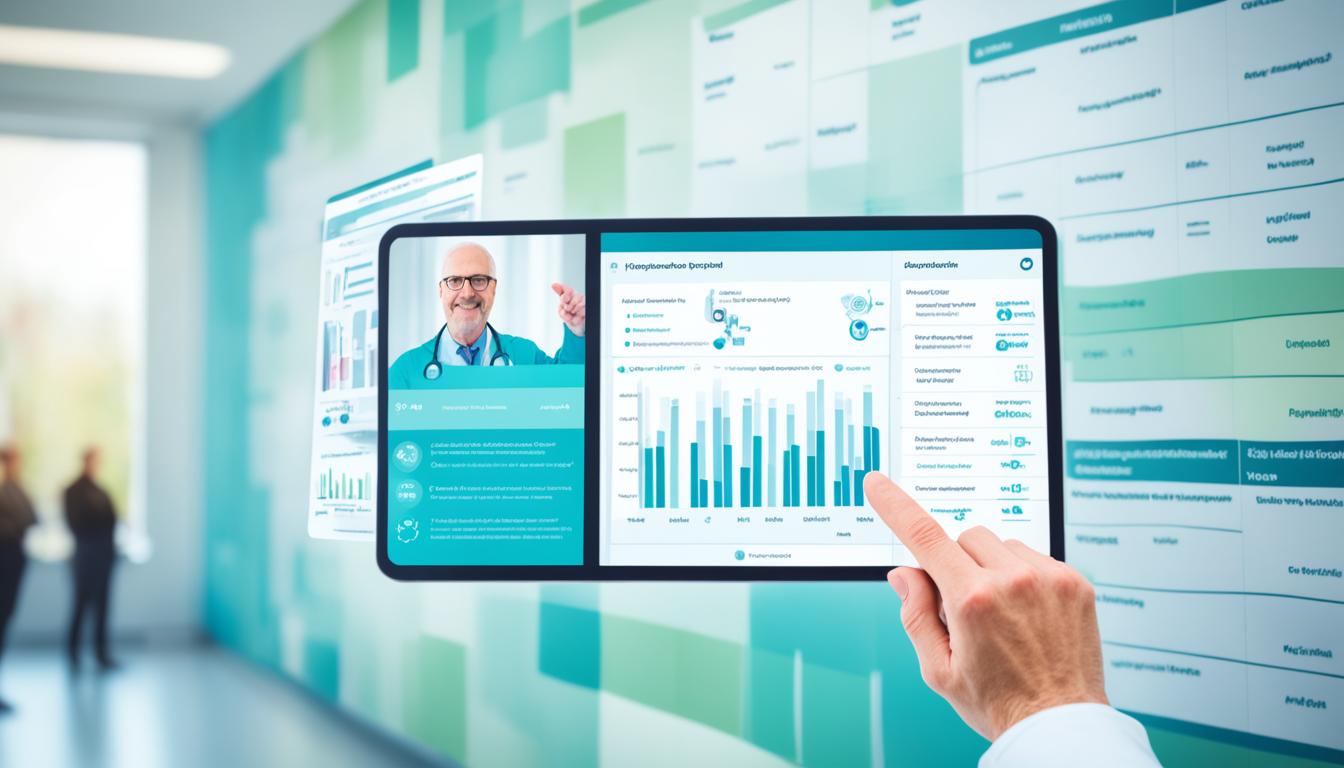In today’s rapidly evolving healthcare landscape, healthcare providers are embracing the power of customer relationship management (CRM) systems to enhance patient care and strengthen client relationships. A healthcare provider CRM enables centralization of patient data, improves communication and engagement, collects valuable feedback, streamlines appointment scheduling, ensures efficient care coordination, personalizes care plans, and utilizes data analytics for informed decision-making.
By implementing a CRM system, healthcare providers can revolutionize patient management and elevate the quality of care they provide. These CRM solutions for medical professionals are designed specifically to cater to the unique needs and requirements of the healthcare industry.
Key Takeaways
- A healthcare provider CRM system is a valuable tool for improving patient relationships and enhancing the quality of care.
- CRM in healthcare centralizes patient data and facilitates seamless communication and engagement.
- Collecting patient feedback through CRM systems allows providers to identify areas for improvement and address patient concerns effectively.
- By streamlining appointment scheduling and care coordination, CRM systems promote efficiency and positive patient experiences.
- Data-driven decision-making using CRM analytics helps healthcare providers optimize operations and improve patient outcomes.
Understanding CRM in Healthcare
CRM systems play a crucial role in healthcare by centralizing and organizing patient data. This allows healthcare providers to effectively manage patient information and provide personalized care. In addition to patient data management, CRM in healthcare also focuses on improving communication and engagement, collecting feedback through surveys, streamlining appointment scheduling, facilitating care coordination, and utilizing analytics for data-driven decision-making and reporting.
One of the key aspects of CRM in healthcare is patient data management. By centralizing patient data in a CRM system, healthcare providers can easily access and update patient information, such as medical history, medication records, and treatment plans. This streamlined data management ensures that healthcare professionals have accurate and up-to-date information to deliver high-quality care.
Furthermore, CRM systems enhance communication and engagement between patients and providers. Through secure messaging platforms and patient portals, patients can easily communicate with their healthcare team, ask questions, and receive timely responses. This improved communication helps establish a strong patient-provider relationship based on trust and collaboration.
To ensure patient satisfaction and continuous improvement, CRM systems enable healthcare providers to collect feedback through surveys and gain valuable insights. By regularly gathering patient feedback, healthcare organizations can identify areas for improvement, address concerns, and implement changes that align with patient needs and preferences.
Moreover, CRM systems offer convenient appointment scheduling, allowing patients to book appointments online or through a mobile app. This self-service approach enhances patient convenience and satisfaction while reducing administrative burdens on healthcare staff.
Care coordination is another essential aspect of CRM in healthcare. By centralizing patient information and facilitating communication between healthcare providers, CRM systems promote seamless care coordination. This ensures that all healthcare professionals involved in a patient’s care have access to the same information, enabling coordinated and efficient care delivery.
CRM systems also support the creation of personalized care plans that are tailored to each patient’s unique needs. Healthcare providers can customize care plans based on patient preferences, medical history, and treatment goals, ensuring that patients receive personalized and effective care.
Lastly, CRM systems provide robust analytics and reporting capabilities. By analyzing patient data, healthcare organizations can gain valuable insights into patient outcomes, identify trends, and make data-driven decisions. These analytics help healthcare professionals optimize care delivery, improve patient outcomes, and enhance operational efficiency.
In summary, CRM in healthcare encompasses patient data management, communication and engagement, feedback and surveys, appointment scheduling, care coordination, personalized care plans, analytics, and reporting. By implementing CRM systems, healthcare providers can enhance patient care, improve communication, streamline operations, and make informed decisions based on data-driven insights.
Enhancing Patient Experience
CRM systems in healthcare play a vital role in enhancing the overall patient experience. By leveraging technology, healthcare providers can improve communication, provide timely access to information, streamline appointment scheduling, and offer personalized care plans tailored to individual patient needs.
Improved Communication
A robust CRM system enables healthcare professionals to communicate more effectively with their patients. With timely and personalized interactions, patients feel heard and valued, leading to a stronger patient-provider relationship. Improved communication fosters trust and enhances patient satisfaction, ultimately improving the overall healthcare experience.
Timely Access to Information
By centralizing patient data within a CRM system, healthcare providers gain easy and quick access to vital information. This enables them to make informed decisions, provide efficient care, and respond promptly to patient inquiries. Timely access to information empowers healthcare professionals to deliver high-quality care and improve patient outcomes.
Streamlined Appointment Scheduling
CRM systems streamline the appointment scheduling process, making it more efficient for both patients and healthcare providers. Through automated reminders and online booking capabilities, patients have greater control over their appointments, while healthcare professionals can optimize their schedules. This leads to reduced wait times, improved patient flow, and increased patient satisfaction.
Personalized Care
A key benefit of CRM systems in healthcare is the ability to deliver personalized care. With access to comprehensive patient data, healthcare providers can create care plans tailored to each individual’s unique needs. Personalized care not only improves patient outcomes but also enhances patient engagement and satisfaction.
With CRM systems in place, healthcare providers can enhance the patient experience through improved communication, timely access to information, streamlined appointment scheduling, and personalized care. These advancements not only lead to happier and more satisfied patients but also contribute to better healthcare outcomes.
Patient Feedback and Satisfaction
One of the key benefits of implementing a CRM system in healthcare is the automation of patient feedback collection and surveys. This allows healthcare providers to gain valuable insights into patient satisfaction and identify areas for improvement. By leveraging patient feedback, healthcare organizations can enhance the overall patient experience and optimize their services.
Addressing patient complaints and concerns is another critical aspect of ensuring patient satisfaction. CRM systems enable healthcare providers to effectively manage and resolve patient complaints by routing them to the appropriate staff members for timely response and resolution. This proactive approach demonstrates a commitment to patient care and fosters a culture of accountability.
“Patient feedback is crucial for healthcare providers to identify areas where improvements are needed and make necessary adjustments to enhance patient satisfaction.”
Timely Response and Resolution
Timely response and resolution of patient complaints play a vital role in maintaining patient trust and satisfaction. CRM systems facilitate efficient communication and collaboration among healthcare providers, ensuring that patient concerns are addressed promptly. By streamlining the complaint management process, CRM systems enable healthcare organizations to deliver timely responses, resolve issues, and prevent potential escalations.
Effective complaint resolution not only enhances patient satisfaction but also strengthens the provider-patient relationship. When patients feel heard, acknowledged, and their concerns are addressed promptly, they are more likely to perceive the healthcare organization positively and remain engaged in their care.
By leveraging CRM systems to capture patient feedback, healthcare providers can actively listen to their patients’ needs, tailor their services to meet those needs, and continuously improve patient satisfaction.
| Benefits of Patient Feedback and Satisfaction |
|---|
| 1. Improved patient experience |
| 2. Enhanced provider-patient relationship |
| 3. Increased patient loyalty and engagement |
| 4. Identification of areas for improvement |
| 5. Prevention of potential issues |
| 6. Strengthened reputation and trust in the healthcare organization |
Care Coordination and Collaboration
In today’s complex healthcare landscape, effective care coordination and collaboration among healthcare providers are crucial for ensuring the delivery of seamless care to patients. Healthcare providers are increasingly turning to CRM systems to facilitate care coordination and improve collaboration among different departments and teams.
A key advantage of CRM systems is the centralized storage and accessibility of patient information. By having a single platform to share patient information, notes, and test results, healthcare providers can streamline their workflows and enhance communication. This centralized system enables different departments within a healthcare organization to access the same patient records, promoting seamless and efficient care.
Through a CRM system, healthcare professionals can easily communicate and collaborate on patient care plans, leading to better coordination and improved outcomes. Real-time updates and notifications allow providers to stay informed about any changes or updates in patient information, ensuring that everyone involved in the patient’s care is on the same page.
“Collaboration is the key to providing well-coordinated care for patients. With a CRM system, healthcare providers can work together more effectively and efficiently, leading to better patient outcomes.”
By leveraging CRM systems, healthcare organizations can break down silos and foster collaboration among various healthcare professionals, including physicians, nurses, therapists, and administrative staff. This collaborative approach improves the quality of care and enhances the patient experience.
Moreover, CRM systems enable healthcare providers to track and manage patient referrals and transitions of care. By having a centralized platform, care coordination becomes more seamless, reducing the risk of information gaps and ensuring smooth transitions between different healthcare settings.
The Benefits of Care Coordination and Collaboration:
- Improved patient outcomes through coordinated care plans
- Enhanced communication and collaboration among healthcare professionals
- Efficient sharing of patient information, notes, and test results
- Streamlined workflows and reduced administrative burdens
- Reduced medical errors and improved patient safety
“Effective care coordination and collaboration are vital components of delivering high-quality, patient-centered care. By leveraging CRM systems, healthcare providers can optimize care delivery and ensure the best possible outcomes for their patients.”
Data-Driven Decision-Making
CRM systems in healthcare are revolutionizing the way data is used to drive decisions and improve patient care. By collecting and analyzing patient data, healthcare providers gain valuable insights that help optimize operations and enhance patient outcomes.
With the power of CRM analytics, healthcare providers can:
- Analyze patient data: CRM systems provide a comprehensive view of patient information, allowing healthcare providers to identify trends in patient outcomes. By analyzing this data, they can make informed decisions and proactively address potential issues in care.
- Allocate resources effectively: By understanding patient data patterns, healthcare providers can allocate resources efficiently. This data-driven approach ensures that resources are optimized to meet patient needs, leading to improved care delivery.
- Enhance patient care: Data-driven decisions enable healthcare providers to tailor care plans to individual patient requirements. By leveraging patient data analysis, providers can offer personalized care that addresses specific needs and improves patient satisfaction.
Implementing a CRM system empowers healthcare providers to make strategic, data-driven decisions that positively impact patient care and operational efficiency.
“Data-driven decision-making is essential in healthcare. By harnessing the power of data analytics, CRM systems enable healthcare providers to optimize operations, allocate resources effectively, and improve patient outcomes.” – Dr. Emma Collins, Chief Medical Officer, Healthcare Innovations Inc.
By utilizing CRM systems to collect and analyze patient data, healthcare providers can optimize operations, improve patient care, and drive better outcomes. Let’s take a look at how these data-driven decisions can be translated into action:
| Data-Driven Decision | Action |
|---|---|
| Identify trends in patient outcomes | Implement targeted interventions and care protocols to address emerging issues and improve patient outcomes. |
| Proactively address potential issues in care | Enhance training programs and protocols to ensure the highest standards of care and patient safety. |
| Allocate resources efficiently | Optimize staffing levels and resource allocation based on patient needs and demand, ensuring timely and effective care delivery. |
| Offer personalized care | Create individualized care plans that address unique patient needs, preferences, and conditions for an enhanced patient experience. |
Challenges and Considerations
Implementing a CRM system in the healthcare industry brings forth several challenges and considerations that need to be addressed. These include:
Data Security and Privacy
Ensuring data security and privacy is of utmost importance when implementing a CRM system in healthcare. Patient information is highly sensitive and must be protected from unauthorized access and breaches. Robust security measures, such as encryption and access controls, should be implemented to safeguard patient data.
Integration with Existing Systems
Integrating a CRM system with existing electronic health record (EHR) systems can pose integration challenges. Seamless data exchange between systems is crucial for efficient workflow and continuity of care. Careful planning and collaboration with IT teams are necessary to ensure successful integration.
Training and Adoption
Staff training is essential for effective utilization of the CRM system. Training sessions should be provided to healthcare professionals to familiarize them with the system’s features and functionalities. Ongoing support and guidance are vital to encourage user adoption and maximize the system’s potential.
Cost
The implementation and maintenance costs of a CRM system in healthcare can vary depending on the size of the organization and the chosen solution. Factors such as licensing fees, infrastructure requirements, and ongoing support should be considered when evaluating the cost-benefit ratio.
Patient Engagement
Considering patient preferences and ensuring their active engagement is crucial for the success of a CRM system. The system should be designed in a patient-friendly manner, offering convenient access to information, personalized communication, and opportunities for feedback. Patient participation and satisfaction play a vital role in the effectiveness of the CRM system.

Quote:
“Implementing a CRM system in healthcare requires addressing challenges related to data security, system integration, staff training, cost, and patient engagement.”
Addressing these challenges and considerations strategically and proactively ensures a successful implementation and utilization of a CRM system in the healthcare industry. By overcoming these obstacles, healthcare organizations can harness the power of CRM to enhance patient care, improve operational efficiency, and achieve sustainable growth.
What Makes the Best CRM for Healthcare?
When it comes to selecting the best CRM for healthcare, certain features and capabilities are essential. A healthcare CRM should have a strong data layer that ensures secure storage and processing of patient information. This not only protects sensitive data but also enables healthcare providers to efficiently access and analyze patient data for better decision-making.
Integration capabilities are another crucial aspect of a healthcare CRM. The system should seamlessly integrate with existing healthcare systems such as electronic health record (EHR) systems, ensuring a smooth flow of information across different platforms. This integration enables healthcare providers to have a comprehensive view of patient data, leading to improved care coordination and better outcomes.
Customizable workflows are key to streamlining processes within a healthcare CRM. Every healthcare organization operates differently, and a CRM that allows customization of workflows to fit specific needs can greatly enhance operational efficiency. Customizable workflows enable healthcare teams to automate repetitive tasks, leading to time and cost savings.
An analytics layer is vital for extracting valuable insights from patient data. By leveraging advanced analytics capabilities, healthcare CRM systems enable healthcare providers to identify trends, patterns, and areas for improvement. These actionable insights contribute to enhancing patient care, optimizing operational efficiency, and driving positive patient outcomes.
| Key Features of the Best CRM for Healthcare |
|---|
| Strong data layer for secure storage and processing |
| Integration capabilities with healthcare systems |
| Customizable workflows for streamlined processes |
| An analytics layer for actionable insights |
Lastly, compliance with healthcare data security regulations is non-negotiable for a healthcare CRM. These systems handle sensitive patient information, and adherence to regulatory standards such as HIPAA is paramount. Ensuring compliance safeguards patient privacy and establishes trust between healthcare providers and their patients.
When evaluating different healthcare CRM options, considering these key features and capabilities will enable healthcare providers to choose the CRM solution that best meets their needs and supports their goals of delivering high-quality care.
Conclusion
CRM systems have revolutionized the healthcare industry by providing healthcare providers with the tools they need to enhance patient-centric care, improve patient satisfaction, and streamline operations. By centralizing patient data, CRM systems enable healthcare professionals to deliver personalized and efficient care, resulting in improved patient outcomes.
Implementing CRM in healthcare aligns with the growing importance of patient-centric care, where the focus is on placing the patient at the center of their healthcare journey. With CRM, healthcare providers can improve communication and engagement with patients, ensuring timely access to information and streamlined appointment scheduling.
Furthermore, CRM systems enable healthcare organizations to collect and analyze patient feedback, allowing them to address any concerns or complaints promptly. By using CRM analytics, healthcare providers can make data-driven decisions to optimize operations, allocate resources effectively, and continuously improve patient care.
In the evolving healthcare landscape, CRM is no longer a luxury; it is an essential tool for healthcare providers to thrive. By embracing CRM in healthcare, organizations can create a patient-centered culture, enhance the patient experience, and ultimately achieve better patient outcomes.
FAQ
What is CRM in healthcare?
CRM in healthcare refers to the use of Customer Relationship Management systems to improve patient care and strengthen client relationships. It involves centralizing and organizing patient data, improving communication and engagement, collecting feedback through surveys, streamlining appointment scheduling, ensuring care coordination, personalizing care plans, and using data analytics for decision-making.
How does CRM in healthcare enhance the overall patient experience?
CRM systems in healthcare improve communication through timely and personalized interactions. They provide healthcare professionals with easy access to patient information, streamline appointment scheduling, and allow for personalized care plans tailored to individual patient needs, enhancing the overall patient experience.
How can CRM systems in healthcare collect and analyze patient data?
CRM systems collect and analyze patient data to make data-driven decisions. Healthcare providers can use CRM analytics to identify trends in patient outcomes, detect potential issues in care, and allocate resources effectively. This data-driven approach improves patient care and helps optimize healthcare operations.
What are the challenges involved in implementing CRM systems in healthcare?
Implementing CRM systems in healthcare comes with challenges such as ensuring data security and privacy, integrating with existing electronic health record systems, training staff for effective use, managing the cost of implementation, and considering patient preferences for engagement.
What features make the best CRM for healthcare?
The best CRM for healthcare should have a strong data layer for secure storage and processing, integration capabilities with healthcare systems, customizable workflows for streamlined processes, an analytics layer for actionable insights, and compliance with healthcare data security regulations.
Why is CRM in healthcare important?
CRM systems have become crucial in healthcare for enhancing patient satisfaction, improving communication, streamlining operations, and making data-driven decisions. Implementing CRM in healthcare aligns with the shift towards patient-centric care and improves overall patient outcomes. CRM is an essential tool for healthcare providers to thrive in the evolving healthcare landscape.



